Fly-tipping costs taxpayers £58m in clean-up costs
- Published
There have been some extreme examples of fly-tipping in the past year
More than one million incidents of fly-tipping were dealt with by councils in England in 2016-17, costing taxpayers £58m to clear up.
It was the fourth year in a row that incidents increased.
About 56,000 fixed penalty notices were handed out by councils to people caught illegally dumping.
The Department for the Environment, Food and Rural Affairs (Defra) said two-thirds of fly-tipping was household waste.
There were 1,002,000 cases of fly-tipping handled by councils in England between April 2016 and March 2017, equivalent to 114 every hour.
This was 66,000 (7%) more than the year before.
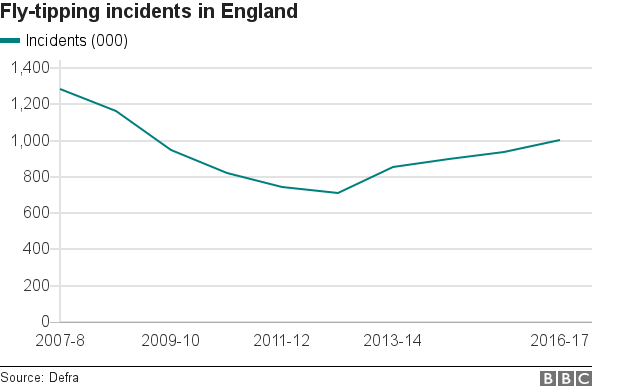
The number of enforcement actions taken by councils, such as investigations and warning letters also decreased slightly
There were 474,000 enforcement actions carried out in England in 2016-17, a drop of 20,000 on the year before, although 56,000 fixed penalty notices were given for small scale dumping.
All councils in England were given new powers that came into force in May 2016 that allowed them to give fixed penalty notices for fly-tipping as well as their existing powers to use them for littering and anti-social behaviour.
The biggest financial penalty of the year £25,541. Birmingham-based meat firm Premium Halal Meat & Poultry was prosecuted at the city's magistrates court in July 2016.
The company had to pay a fine and costs after being prosecuted by Birmingham City Council.

'It costs the victim to remove the rubbish'
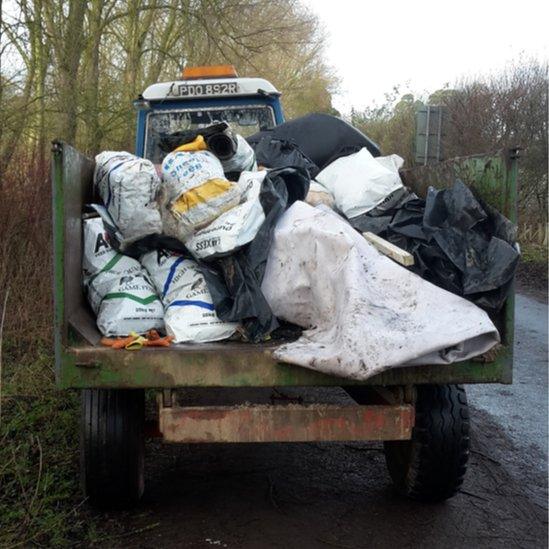
Two tractor trailer loads of rubbish were dumped on George Winn-Darley's land
For George Winn-Darley, the £400 fixed penalty charged to fly-tippers is half what it costs him to clear his land.
Aldby Park country estate at Buttercrambe, near Stamford Bridge in East Riding of Yorkshire, has been hit numerous times by fly-tipping.
The last time it took a team of workers 46 hours between them to shift it, filling two trailer loads, at a cost of £800 - twice the maximum penalty a council can levy without going to court.
Mr Winn-Darley said: "Fixed penalty notices are really ineffective. Local authorities need to crack down hard by increasing fines, seizing vehicles and even imprisonment. At the moment, it is more expensive for the victim to remove the fly-tipped waste from private land than the cost of the fixed penalty notice."

'Tip is only 5 miles away'
Allow X content?
This article contains content provided by X. We ask for your permission before anything is loaded, as they may be using cookies and other technologies. You may want to read X’s cookie policy, external and privacy policy, external before accepting. To view this content choose ‘accept and continue’.
Crime author Daisy White said she is seeing more fly-tipping in west Sussex.
The 40-year-old said: "The last few weeks someone has dumped a load of household rubbish, a fridge and a washing machine along the verge near us.
"To give them their due Horsham and District Council come out and pick up all the fly-tipping very quickly and efficiently, and they are yet to charge us. However, the main tip is only five miles up the road."

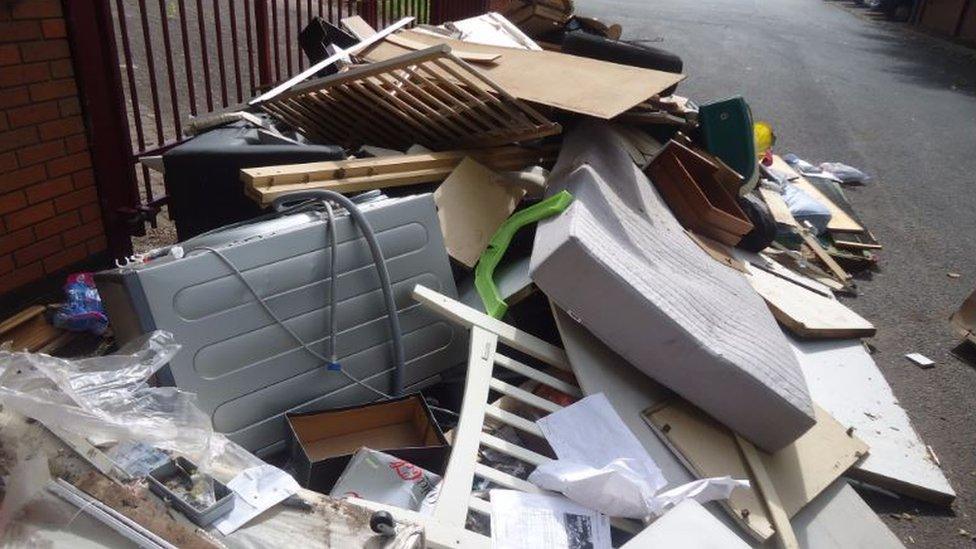
Fly-tipping has increased for the fourth year in a row
The most common place for waste to be dumped was at the side of the road.
Defra said two-thirds (67%) of fly-tips "involved household waste".
"Total incidents involving household waste increased by 8% from 2015/16."
In a report accompanying the statistics Defra said: "Many local authorities have started to improve the way they capture and report fly-tips over the past few years, so the increase over time should be interpreted with some care."
The Country and Land Business Association (CLA) said it wanted to see tougher penalties imposed.
Councils have the power to give people a fixed penalty of up to £400 for small-scale dumping, a power they used 56,000 times during the year.
How do you stop fly-tipping and littering?
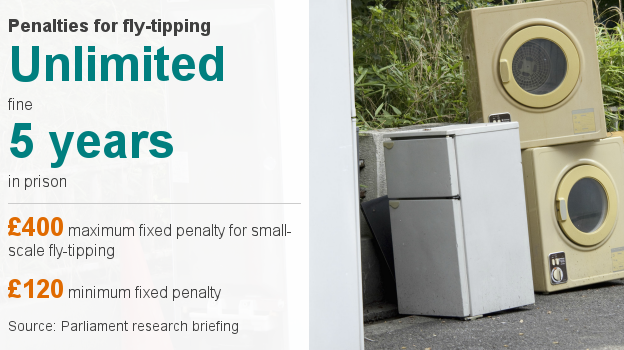
The costs revealed by Defra are only those incurred by local authorities, who do not have to remove fly-tipped waste from private land.
The CLA, whose members - landowners, farmers and rural businesses - face the cost of cleaning up rubbish dumped on their land, said it came to between £100m and £150m a year.
Its president Ross Murray said: "Fly-tipping is not a victimless crime. Private landowners are liable for any waste dumped on their land and are fed up of clearing away other people's rubbish and paying for the privilege. If they don't act, they risk prosecution for illegal storage of waste which is simply not fair.
'Unacceptable blight'
"People would be more encouraged to do the right thing and dispose of their rubbish through proper legal channels if they have facilities available to them and see that fly-tipping fines are enforced.
"However, to really combat the crime we need to see tougher penalties which act as a true deterrent. Often, it is more expensive for the victim to remove the fly-tipped waste than the fixed penalty notice to the perpetrator. Imposing and enforcing penalties which better reflect the seriousness of the crime, such as seizing vehicles used to fly-tip, is vital."
A Defra spokesman said: "Fly-tipping is an unacceptable blight on our landscape, which is why we have cracked down on offenders by strengthening sentencing guidelines and giving councils the powers to hand out on-the-spot fines to fly-tippers.
"We have made it easier for vehicles suspected of being used for fly-tipping to be stopped, searched and seized and will continue to work with local partners to stop this inexcusable crime."

The largest number of incidents recorded was in Enfield in London, with 75,614. This was a rise of 7% on the previous year and was equivalent to 228 fly-tipping incidents for every 1,000 residents.
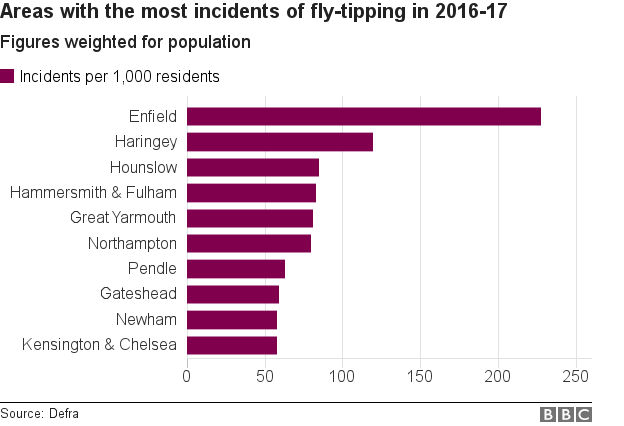
An Enfield Council spokesman said the figures produced by Defra were "clearly ludicrous" and were down to differences in the way councils report their fly-tipping statistics.
He said: "This ridiculous anomaly has arisen because, unlike Enfield, other local authorities do not report fly tips that are cleared before they are reported by the public. If Enfield adopted the same approach we would report in the region of 5,900 fly tips a year putting us significantly below Barnet, Waltham Forest and Camden."
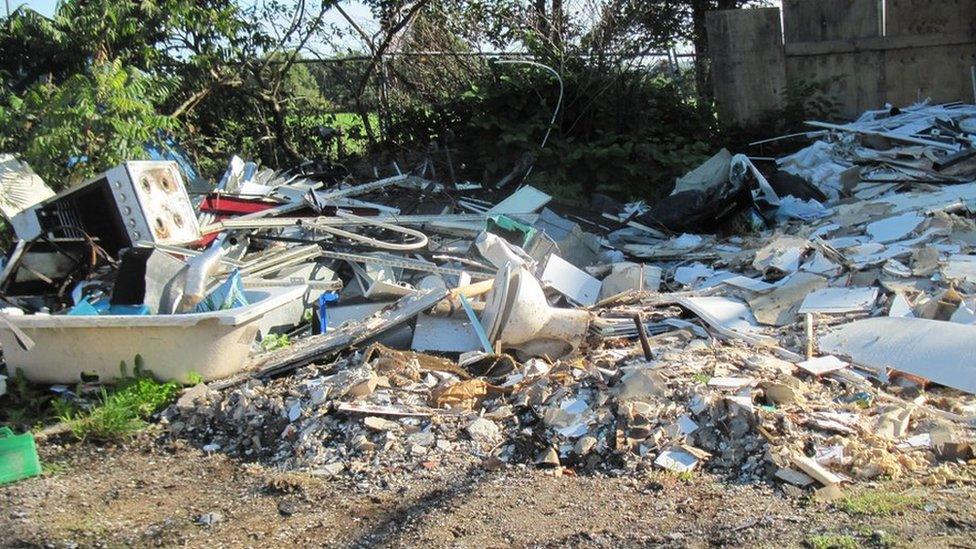
The Environment Agency said a serial fly-tipper jailed in 2015 'wilfully ignored' waste regulations
The Local Government Association, which represents councils, said cleaning up fly-tipping was diverting money away from other services.
Its environment spokesman Martin Tett said: "The Government has responded to our call for councils to be able to apply Fixed Penalty Notices for small scale fly-tipping - and this is a big step in the right direction.
"When they take offenders to court, councils need a faster and more effective legal system which means fly-tippers are given hard-hitting fines for more serious offences. Manufacturers also need to provide more take-back services so people can hand in old furniture and mattresses when they buy new ones."
- Published19 September 2016
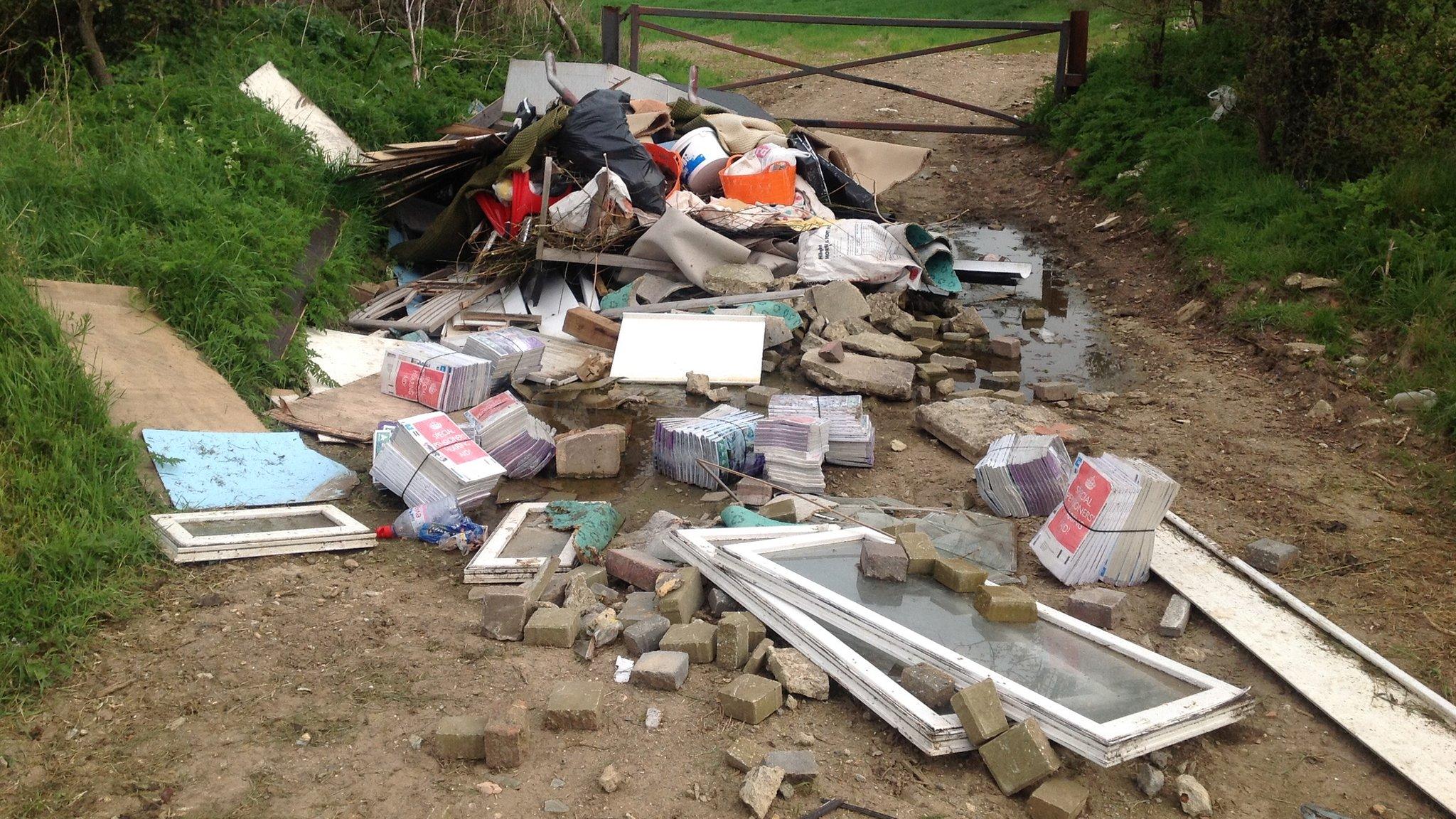
- Published14 September 2016
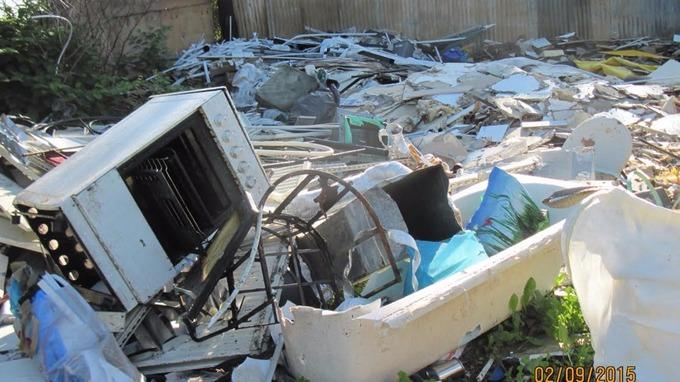
- Published22 November 2014
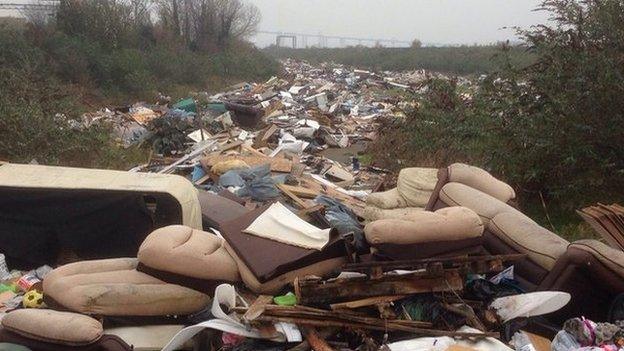
- Published23 August 2017
